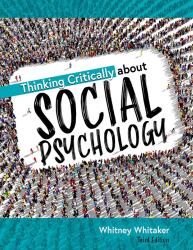Thinking Critically About Social Psychology
Author(s): Whitney Whitaker
Edition: 3
Copyright: 2023
Pages: 358
Choose Your Platform | Help Me Choose
Social Psychology is all about common sense, right? Sometimes. Other times, the beliefs and attitudes we have about human behavior are nothing but myths we’ve picked up along the way. It is these myths that Dr. Whitney Jeter’s Thinking Critically About Social Psychology helps dispel. Through an education in the fundamentals of social psychology and an exploration of social issues relevant to today, Thinking Critically About Social Psychology equips students to encounter and carefully consider the validity of societal beliefs surrounding the way we behave.
Through an interactive, engaging text filled with real-life examples illustrating chapter concepts, Jeter provides students and professors alike with a user-friendly and understandable eBook.
Thinking Critically About Social Psychology features:
- Numerous visual charts per chapter to aid understanding.
- Interactive Thinking Critically and Check Your Understanding sections that stimulate thought and test student comprehension by allowing students to engage with the text by typing/selecting answers.
- Bold terms allowing students to easily discover definitions by hovering over them with the mouse.
- A Suggested Readings section that concludes each chapter and promotes further study.
Chapter One: An Introduction to Social Psychology
Learning Objectives
Chapter Outline
Opening
Social Psychology vs. Common Sense
Definition of Social Psychology
Historical Perspectives of Social Psychology
Social Psychology in Contemporary Psychology
Approach of the Textbook
Suggested Readings
References
Chapter Two: Research Methods
Learning Objectives
Chapter Outline
The Truth Is Out There
The Goals of Research
Steps in the Research Process
The Scientific Method
Experimental Method
Nonexperimental Methods
References
Chapter Three: Social Cognition: A World of Beliefs
Learning Objectives
Chapter Outline
Social Cognition
The Power of Thoughts: Thinking and Beliefs
When Expecting It Makes It Happen: Self-Fulfilling Prophecy
Worth 1000 Words: Forming Impressions
Evaluating Others
Attributions
Biases, Blindsides, and Blunders: Human Error
Conclusion
Advanced Topics/Suggested Readings
References
Chapter Four: The Self
Learning Objectives
Chapter Outline
Establishing One’s Identity
Defining the Self
Evaluating the Self
Maintaining the Self
Conclusion
Advanced Topics and Additional Readings
References
Chapter Five: Gender
Learning Objectives
Chapter Outline
What Is Gender?
Gender Differences and Identity
Gender Roles
Male, Female, and Custom
Gender Relations
Sexuality
Minority Stress Model
References
Chapter Six: Attitudes and Persuasion
Learning Objectives
Chapter Outline
Attitudes
Attitude Measurement
Attitude Formation
Attitude Change
Do Attitudes Always Predict Behaviors
Persuasion
Researching Attitude Change
Conclusion
Suggestions for Further Reading
References
Chapter Seven: Social Influence
Learning Objectives
Chapter Outline
Social Influence
Conformity
Compliance
Obedience
Group Behavior
Advanced Topics
References
Chapter Eight: Prosocial Behaviors
Learning Objectives
Chapter Outline
Why Do We Help? Characteristics of the Helper
When Do We Help? Situational Characteristics
Whom Do We Help? Victim/Receiver Characteristics
Diverse Samples in the Study of Prosocial Behaviors
Conclusion
References
Chapter Nine: Aggression
Learning Objectives
Chapter Outline
Aggression
Factors That Influence Aggression
Reducing Aggression
Conclusion
Additional Readings
References
Chapter Ten: Prejudice
Learning Objectives
Chapter Outline
Prejudice Defined
Researching Prejudice
The Roots of Prejudice: Categorization
Social and Evolutionary Processes Involved in Prejudice
How Categorization Influences Our Perceptions and Judgments
Stereotype Threat
What Can We Do About Prejudice?
Conclusion
Additional Resources
References
Chapter Eleven: Love and Attraction
Learning Objectives
Chapter Outline
Love and Attraction
Attraction
Love
References
Chapter Twelve: Competition, Conflict, and Cooperation
Learning Objectives
Chapter Outline
Conceptualizing the Concepts
A Closer Look at Competition and Conflict
Cooperation
Conclusions
Key Takeaways
Additional Resources
Suggestions for Further Reading
References
Chapter Thirteen: Culture & Group Dynamics
Learning Objectives
Chapter Outline
Introduction
What is Culture?
The Social Animal vs. the Cultural Animal
Cultural Roots
What is a Social Group?
Cultures as Groups
Conclusions
References
Chapter Fourteen: Applied Social Psychology
Learning Objectives
Chapter Outline
Chapter Overview
Positive Psychology
Mental Health
Industrial/Organizational Psychology
Conclusions
Additional Resources and Readings
References
Index
I have taken many classes and read many textbooks and too many of the authors seem to be more worried about making a statement about how intelligent they are than educating students. Thinking Critically About Social Psychology is written in a format that makes it easy to understand the information while still showing the author’s knowledge in the field.
Michael Palmer, Student, Fort Hays State University
Thinking Critically About Social Psychology is the most reader-friendly textbook I have had the opportunity to use. The writers did a great job of keeping the content informative in a concise, easy-to-read style. As a visual learner, I often find it distracting when pages have an overabundance of content in the margins. I appreciate the authors keeping this to a minimum, with mostly just definitions in the margins for easy reference.
It was interesting how the book used current examples, such as the riots in Ferguson, to illustrate some of the topics of study. I found the “thinking critically boxes” to be a fun and effective way to test myself or consider how the topics applied to my life experiences.
One of the stated goals of the authors was for students to have a briefer textbook with accurate information at a reasonable price. As a student, I believe they nailed it. It was informative and enjoyable to read.
Scott Emeola, Student, Friends University
Social Psychology is all about common sense, right? Sometimes. Other times, the beliefs and attitudes we have about human behavior are nothing but myths we’ve picked up along the way. It is these myths that Dr. Whitney Jeter’s Thinking Critically About Social Psychology helps dispel. Through an education in the fundamentals of social psychology and an exploration of social issues relevant to today, Thinking Critically About Social Psychology equips students to encounter and carefully consider the validity of societal beliefs surrounding the way we behave.
Through an interactive, engaging text filled with real-life examples illustrating chapter concepts, Jeter provides students and professors alike with a user-friendly and understandable eBook.
Thinking Critically About Social Psychology features:
- Numerous visual charts per chapter to aid understanding.
- Interactive Thinking Critically and Check Your Understanding sections that stimulate thought and test student comprehension by allowing students to engage with the text by typing/selecting answers.
- Bold terms allowing students to easily discover definitions by hovering over them with the mouse.
- A Suggested Readings section that concludes each chapter and promotes further study.
Chapter One: An Introduction to Social Psychology
Learning Objectives
Chapter Outline
Opening
Social Psychology vs. Common Sense
Definition of Social Psychology
Historical Perspectives of Social Psychology
Social Psychology in Contemporary Psychology
Approach of the Textbook
Suggested Readings
References
Chapter Two: Research Methods
Learning Objectives
Chapter Outline
The Truth Is Out There
The Goals of Research
Steps in the Research Process
The Scientific Method
Experimental Method
Nonexperimental Methods
References
Chapter Three: Social Cognition: A World of Beliefs
Learning Objectives
Chapter Outline
Social Cognition
The Power of Thoughts: Thinking and Beliefs
When Expecting It Makes It Happen: Self-Fulfilling Prophecy
Worth 1000 Words: Forming Impressions
Evaluating Others
Attributions
Biases, Blindsides, and Blunders: Human Error
Conclusion
Advanced Topics/Suggested Readings
References
Chapter Four: The Self
Learning Objectives
Chapter Outline
Establishing One’s Identity
Defining the Self
Evaluating the Self
Maintaining the Self
Conclusion
Advanced Topics and Additional Readings
References
Chapter Five: Gender
Learning Objectives
Chapter Outline
What Is Gender?
Gender Differences and Identity
Gender Roles
Male, Female, and Custom
Gender Relations
Sexuality
Minority Stress Model
References
Chapter Six: Attitudes and Persuasion
Learning Objectives
Chapter Outline
Attitudes
Attitude Measurement
Attitude Formation
Attitude Change
Do Attitudes Always Predict Behaviors
Persuasion
Researching Attitude Change
Conclusion
Suggestions for Further Reading
References
Chapter Seven: Social Influence
Learning Objectives
Chapter Outline
Social Influence
Conformity
Compliance
Obedience
Group Behavior
Advanced Topics
References
Chapter Eight: Prosocial Behaviors
Learning Objectives
Chapter Outline
Why Do We Help? Characteristics of the Helper
When Do We Help? Situational Characteristics
Whom Do We Help? Victim/Receiver Characteristics
Diverse Samples in the Study of Prosocial Behaviors
Conclusion
References
Chapter Nine: Aggression
Learning Objectives
Chapter Outline
Aggression
Factors That Influence Aggression
Reducing Aggression
Conclusion
Additional Readings
References
Chapter Ten: Prejudice
Learning Objectives
Chapter Outline
Prejudice Defined
Researching Prejudice
The Roots of Prejudice: Categorization
Social and Evolutionary Processes Involved in Prejudice
How Categorization Influences Our Perceptions and Judgments
Stereotype Threat
What Can We Do About Prejudice?
Conclusion
Additional Resources
References
Chapter Eleven: Love and Attraction
Learning Objectives
Chapter Outline
Love and Attraction
Attraction
Love
References
Chapter Twelve: Competition, Conflict, and Cooperation
Learning Objectives
Chapter Outline
Conceptualizing the Concepts
A Closer Look at Competition and Conflict
Cooperation
Conclusions
Key Takeaways
Additional Resources
Suggestions for Further Reading
References
Chapter Thirteen: Culture & Group Dynamics
Learning Objectives
Chapter Outline
Introduction
What is Culture?
The Social Animal vs. the Cultural Animal
Cultural Roots
What is a Social Group?
Cultures as Groups
Conclusions
References
Chapter Fourteen: Applied Social Psychology
Learning Objectives
Chapter Outline
Chapter Overview
Positive Psychology
Mental Health
Industrial/Organizational Psychology
Conclusions
Additional Resources and Readings
References
Index
I have taken many classes and read many textbooks and too many of the authors seem to be more worried about making a statement about how intelligent they are than educating students. Thinking Critically About Social Psychology is written in a format that makes it easy to understand the information while still showing the author’s knowledge in the field.
Michael Palmer, Student, Fort Hays State University
Thinking Critically About Social Psychology is the most reader-friendly textbook I have had the opportunity to use. The writers did a great job of keeping the content informative in a concise, easy-to-read style. As a visual learner, I often find it distracting when pages have an overabundance of content in the margins. I appreciate the authors keeping this to a minimum, with mostly just definitions in the margins for easy reference.
It was interesting how the book used current examples, such as the riots in Ferguson, to illustrate some of the topics of study. I found the “thinking critically boxes” to be a fun and effective way to test myself or consider how the topics applied to my life experiences.
One of the stated goals of the authors was for students to have a briefer textbook with accurate information at a reasonable price. As a student, I believe they nailed it. It was informative and enjoyable to read.
Scott Emeola, Student, Friends University




